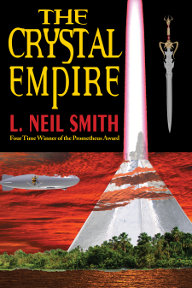
Classified Ads
Three ads this week
• READ ARTICLE
Letters to the Editor
from E.J. Totty, World Net Daily, L. Neil Smith, and A.X. Perez
• READ ARTICLE
March of the Medical Marxists
by L. Neil Smith
I'm just like everybody else. For months I listened to and watched
"town meetings", originally cobbled together in the home districts of senators and
representatives, simply and transparently for the purpose of rubberstamping Barack
Obama's obsessive Marxist lust (an obsessive lust he shares with Hillary Clinton and
many another tired, threadbare old collectivist) to nationalize an institution that
they refer to as "healthcare".
• READ ARTICLE
The Influence of the State on Relationships
by Bob Wallace
Genesis told us what it was like without our advanced technology:
men worked outdoors and sweated all the time and women were constantly pregnant.
• READ ARTICLE
The Zeitgeist of Totalitarianism
by Puck T. Smith
If you are one the three people left in the world who are not
familiar with The Zeitgeist Movement or The Venus Project, please
move along. For the rest of you I would like to offer two videos for your perusal.
Together they will burn up about an hour of your time. I can fully understand why
you might not want to watch them, but the following will not make a lot of sense
if you don't.
• READ ARTICLE
The End of the Minarchist/Anarchist Dispute
by Paul Bonneau
The feud between minarchists and anarchists has come to an end.
Most of them just don't realize it yet.
• READ ARTICLE
Twenty-three words or less
by Sov. Madison MacBear
Ladies and Gentlemen, Sovereigns and Sentients: And Now, for
your Delectation and Delight, I shall attempt to confound Lucille Gallegos Kropotkin
(and by proxy, El Neil) by defining, for the first time herein attempted, the
difference between religion and mysticism in twenty-three words or less.
• READ ARTICLE
Lysenko's Revenge
by L. Neil Smith
Once upon a time, one Trofim Denisovich Lysenko—and I should
add that I owe this insight to my good friend and cherished colleague Albert Perez—was
a peasant lad who attended a local university and quickly rose to become the supreme galootie
of Russian agriculture, all because of a theory of his that clicked with certain aspects of
Marxism.
• READ ARTICLE
Entrapment and Statutory Crimes
by Jim Davidson
I believe that writing this essay, is the correct thing to do.
It is certainly not "diplomatic" or any of the other things you've come to expect
me not to care about. It isn't expedient - I'll probably lose some friends, including
a few that I really care about. It isn't convenient. The timing sucks in a lot of
ways. I'd rather this whole situation had never arisen. But writing this note is
the right thing to do, and I believe that I have only one tangible moral obligation:
to do what I believe is the right thing to do. I don't think you have any reasonable
expectation that I'll do what people expect, or would rather, or think is socially
acceptable. Certainly if you've known me for any length of time, you know that I
really don't care what anyone thinks, or says, against me.
• READ ARTICLE
Egypt, Liberty and Secession
by Russell D. Longcore
Just a moment ago, we saw a televised news report which stated
that new Egyptian VP Suleiman went on state TV and announced that Egyptian President
Hosni Mubarak was in fact stepping down and handing over governmental power to the
military. Back a few days ago, I suggested that Mubarak leave the country and phone
in his resignation from safer environs. Well, he's pretty much done that today, except
he ran for the eastern palace in posh Sharm al Sheikh, 250 miles from Cairo. From that
location, he can go anywhere into exile. Now the hard work begins.
• READ ARTICLE
A History of Freedom of Thought
Chapter VII
The Progress of Rationalism
(Nineteenth Century)
by John Bagnell Bury
Modern science, heralded by the researches of Copernicus, was founded
in the seventeenth century, which saw the demonstration of the Copernican theory, the
discovery of gravitation, the discovery of the circulation of the blood, and the foundation
of modern chemistry and physics. The true nature of comets was ascertained, and they ceased
to be regarded as signs of heavenly wrath. But several generations were to pass before
science became, in Protestant countries, an involuntary arch-enemy of theology. Till the
nineteenth century, it was only in minor points, such as the movement of the earth, that
proved scientific facts seemed to conflict with Scripture, and it was easy enough to explain
away these inconsistencies by a new interpretation of the sacred texts. Yet remarkable facts
were accumulating which, though not explained by science, seemed to menace the credibility
of Biblical history. If the story of Noah's Ark and the Flood is true, how was it that beasts
unable to swim or fly inhabit America and the islands of the Ocean? And what about the new
species which were constantly being found in the New World and did not exist in the Old?
Where did the kangaroos of Australia drop from? The only explanation compatible with received
theology seemed to be the hypothesis of innumerable new acts of creation, later than the Flood.
It was in the field of natural history that scientific men of the eighteenth century suffered
most from the coercion of authority. Linnaeus felt it in Sweden, Buffon in France. Buffon was
compelled to retract hypotheses which he put forward about the formation of the earth in his
Natural History (1749), and to state that he believed implicitly in the Bible account
of Creation.
• READ ARTICLE
Atlantea The Beautiful No. 113
by L. Neil Smith and Rex May
Number 113 of a weekly cartoon series.
• READ ARTICLE
Agenda 21: The United Nations Programme of Action

Planning for Your future, serf!

www.baloocartoons.com










